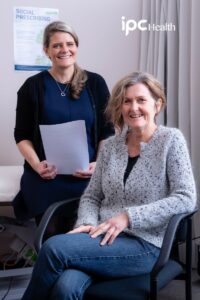Based in Melbourne, IPC Health is one of the largest Community Health Centres in the state of Victoria, Australia. Through a single point of contact, IPC Health connects their clients to a full spectrum of care and support using consistent and collaborative integrated care approaches.
The CHC’s six campuses provide a diverse range of services to the community including medical, dental, allied health, psychosocial services such as general counselling, gambler’s help, and alcohol and other drugs counselling, and aged care services including home care packages.
The organization also works with local communities to address and strengthen major contributors to wellbeing and quality of living, for example in the areas of family violence, child and family services, activity groups, health promotion and community strengthening.
Beginning in July 2019, IPC Health partnered with North Western Melbourne Primary Health Network (NWMPHN), Brimbank City Council, and the Australian Health Policy Collaboration at Victoria University to pilot a small scale social prescribing project, with a three stage process of research, testing and implementation at IPC Health’s Deer Park campus and within the Brimbank community. Brimbank is in the third lowest index of socio-economic disadvantage in the state of Victoria.
The City of Brimbank was chosen due to the following rates of health risks:
- Second lowest participation in health enhancing physical activity
- 1 in 5 people have poor to fair self -reported health status for (38% above Australian rate)
- 10.2% of adults have mental health conditions compared to 7.9% average in Melbourne
- 1 in 8 men with high or very high psychological stress (37% above the Australian rate)
- Sixth highest rate of diabetes in greater Melbourne (63% above Australian average)
- Low learning achievement in early school leavers (15yrs) and/ or young adults with poor employment prospects: 14.2 % of youth (15-24yrs) unemployed (16% greater than Australia)
- Poor English proficiency in Brimbank that is three times that of Melbourne
The Social Prescribing program endeavours to systematically build pathways that make use of community organisations as assets for the delivery of health and wellbeing interventions. It adopts a holistic approach using social prescriptions (social, therapeutic and practical support) to complement traditional forms of health care and move people towards prevention through factors that are protection of health and wellbeing.

Similar approaches are wide implemented in the United Kingdom and Canada with expanding evidence of positive impacts on mental and physical health outcomes. While there has been less development in Australia, on 9 May 2021 the Victoria Government announced funding for Social Prescribing trials in their 2021 State Budget. Pilots will be established across eight Victorian regions and operate for three years in partnership with Victoria’s new local mental health and wellbeing services.
IPC Health is encouraged by the record amount of spending in this area and that the state government is acting on the findings of the Royal Commission into Victoria’s Mental Health System. IPC Health’s CEO Jayne Nelson said, “Working in the under-resourced growth corridor of west Melbourne, we see the impacts of long waiting lists and being unable to access appropriate levels of help before mental health issues start to escalate. As a Community Health Centre, with extensive knowledge of how social prescribing can be implemented within the Australian service system context, we are well placed to have greater impact on our diverse communities.”
By introducing social prescribing for individuals for whom traditional forms of medical/health care alone are insufficient, IPC’s pilot project is helping demonstrate that this approach can:
- improve the psychosocial wellbeing of Social Prescribing clients
- reduce the burden of workload for clinicians
- prevent escalation of potentially complex health risks and avoidable emergency department presentations
IPC’s project model is delivered by a multidisciplinary team including nurses, social workers, and counsellors who function as Wellbeing Coordinators. This integrated approach allows the client to receive evidence-based support from a range of health care professionals in a community setting. It also brings together a diverse collective of backgrounds which results in rich peer-to-peer learning experiences and opportunities for reflective practice.
The COVID-19 pandemic significantly impacted the delivery of the pilot as multiple hard lockdowns forced the closure of community centres and non-essential services, pushing planned activity and social groups online. This, in turn, resulted in limited options for fulfilling social prescriptions. Despite this, IPC Health received 477 referrals from June 2019 to July 2021.
Having established a feasible model of care for social prescribing in Brimbank, IPC Health was pleased to receive further funding from the NWMPHN in December 2020, extending the collaborative into the neighbouring Local Government Area of Wyndham. Together IPC Health and NWMPHN aim to collect patient reported health outcome measures and patient reported experience measures to improve the current knowledge base for social prescribing benefits within an Australian context. IPC Health looks forward to sharing more insights over the months ahead.
Follow IPC Health’s social prescribing journey via their website. Connect with IPC Health on Facebook, Twitter and LinkedIn.




